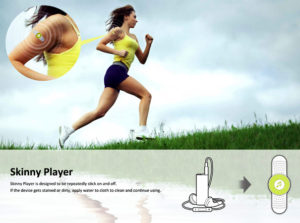Small innovations, big changes
15 October 2014
By Hallvard Barbogen, Content Manager
I’m both a keen runner and into my music, so think how impressed I was to read about the Skinny Player, a music player powered by the body heat you produce when working out. It was one the best things I’ve seen in ages – just imagine producing your own electricity while running. Not to mention the psychological boost of having to keep up your heart rate to keep the music playing. I was sold.
Unfortunately the device is still a prototype at the time of writing, and isn’t available on the mass market yet, so I have to keep running with my old iPod. But the brilliance of the concept still sticks with me. It’s so simple – based on the same principle as the front lights on my bicycle when I was a kid.
Harvesting energy like this is really an old idea, but has resurged as a basic tenet of much of what is done in the cleantech sector these days. Alongside smart technology and the ‘Internet of Things’, it is starting to produce some interesting results – be it on the level of consumer electronics, energy use in buildings or on a mass scale.
One of the best recent examples of smart cleantech is local warming of large buildings, a concept fronted at MIT’s recent Demo Day. Simply put, it means connecting a building’s heating system to your smartphone. The system can then adjust the heating wherever you go and let others in the same room regulate the temperature around them – all the while making considerable energy savings by leaving unused rooms and spaces colder.
A similar concept is the smart shower system newly developed by SmarTap. Some of its functions are admittedly more convenient than green, like the location tracker that fills the bathtub while you’re walking home. But for hotels, gyms and other institutions, detailed control of water consumption means a much greener footprint. According to the UK Environment Agency, some hotels can halve the water their guests consume by making water use more efficient.
On a smaller level, quirky gadgets like a solar powered electric toothbrush are typically still a bit too expensive to be considered mass market products, while a solar light cap is perhaps just a bit too geeky. But while I’m waiting for my body heat music player to hit the market, what is really interesting is the emergence of accessible and affordable hydrogen-powered phone chargers, solar-powered lamps and jump ropes that generate electricity.
 Even if these particular gadgets don’t become mass market successes, they are part of a movement that is becoming mainstream. And that is what cleantech is all about – not just the renewable energy sector, but the whole range of products that surround us every day that are now all becoming greener.
Even if these particular gadgets don’t become mass market successes, they are part of a movement that is becoming mainstream. And that is what cleantech is all about – not just the renewable energy sector, but the whole range of products that surround us every day that are now all becoming greener.
These developments are also challenging those analysts who so far are unimpressed by cleantech and renewable energy, and argue – like 60 Minutes – that cleantech has become “a dirty word”. The ‘Cleantech Crash’, as it became known, refers to a perceived implosion of the sector following an apparent lack of return seen from the billions poured in to date.
But cleantech consultancies like Kachan make a sound case for why we should stick with it. They argue that the cleantech market follows a similar development to the dot-com curve. That is, overhyped expectations are initially met with poor returns; but after a slump in the market and a reality check, gradual and steady growth occurs alongside a transition to the mainstream.
And it is here we come back to my body heat music player, the smart shower and the solar powered lamps – and all the other gadgets and smart systems. They aren’t revolutionary changes, but instead small contributions to an overall progress towards smart and clean systems becoming a normalised part of everyday life. In 2015, we should expect to see a continuation of this transition towards mainstream cleantech.
Now, what about you? Is there a particular type of cleantech you believe in? Have any cleantech gadgets become part of your life recently – or are there any inventions you really want to see in the coming year?

